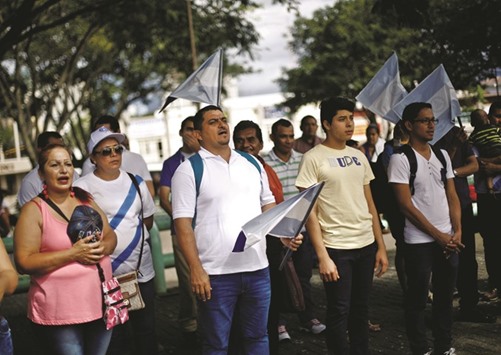The US is “deeply concerned” by the election in Nicaragua, a state department spokesman said, a day after former Marxist guerrilla Daniel Ortega clinched a third consecutive term as president.
Ortega cruised to a landslide victory after winning over voters with years of strong economic growth and poverty reduction.
Nicaraguans chose to overlook the opposition’s accusations that he is building a family dynasty.
The 70-year-old former guerilla fighter, who ran with his wife, Rosario Murillo, as vice president, had 72.5% of the votes, with 99.8% of polling stations counted, the electoral board said.
By fusing his militant past with a more business-friendly approach, Ortega stands in stark contrast to many once-dominant Latin American leaders whose popularity has plummeted in recent years after they failed to bring more prosperity.
Poverty in Nicaragua has fallen almost 13 percentage points under his rule, according to the World Bank. Still, the vote attracted strong criticism from the US, which has a long and checkered relationship with Ortega.
“The US is deeply concerned by the flawed presidential and legislative electoral process in Nicaragua, which precluded the possibility of a free and fair election on Sunday,” spokesman Mark Toner said in a statement.
He accused the Ortega government of sidelining opposition candidates and limiting local monitoring at polls, and for not inviting international election observers, which Toner said “further degraded the legitimacy of the election.”
“We continue to press the Nicaraguan government to uphold democratic practices including press freedom and respect for universal human rights in Nicaragua,” Toner added.
The US government’s criticism recalls decades of animosity between the two countries.
Ortega, who led troops against US-backed rebels, invoked the years of American meddling in Nicaragua when he cast his vote on Sunday night.
“Now it’s us, the Nicaraguans, who decide because we no longer have a single Yankee general here,” Ortega said. “It’s we Nicaraguans who count the votes.
This is a sovereign democracy.”
Ortega and US President Barack Obama have maintained a relatively cordial relationship, although the Nicaraguan leader accused Washington of “interference” in September after Congress passed the Nica Act, which makes US funds for Nicaragua contingent on progress on democracy, human rights and anti-corruption efforts.
Opponents have accused Ortega of trying to establish a “family dictatorship” in the country after his Sandinistas pushed constitutional changes through Congress in 2014 that ended presidential term limits.
The opposition has been weak and divided for years. Ortega’s main rival, the centre-right Liberal Constitutionalist Party (PLC) candidate Maximino Rodriguez, came in a distant second with 15% of votes, the board said.

Nicaraguans living in Costa Rica demonstrate against what they call an electoral farce in Nicaragua.
